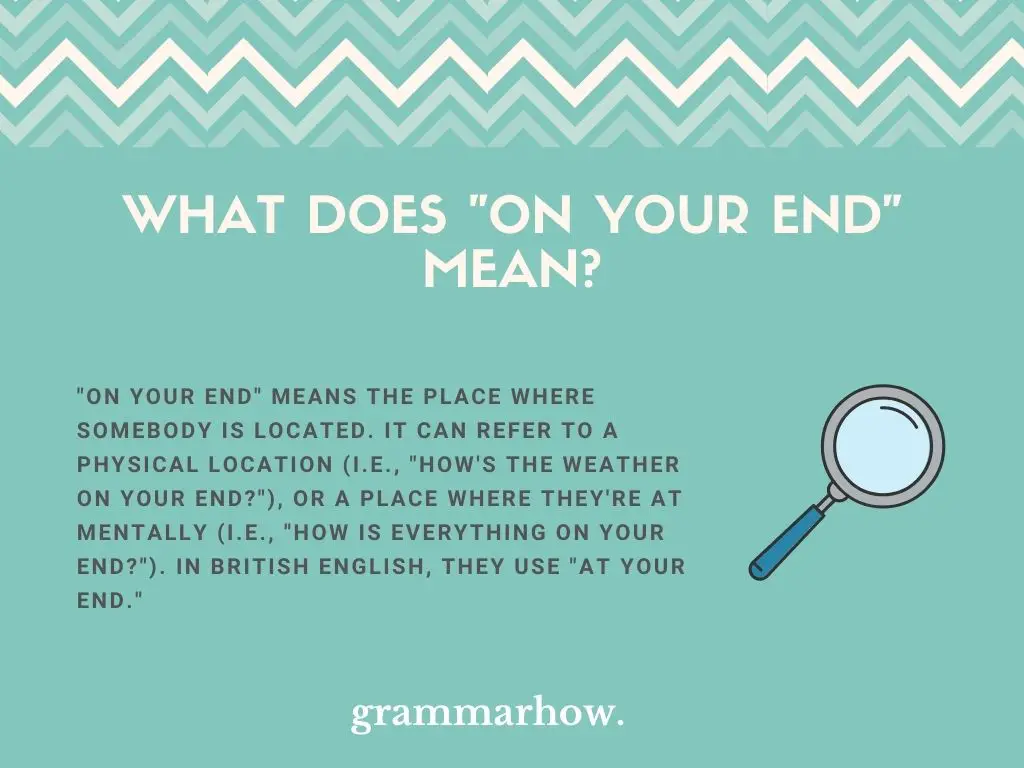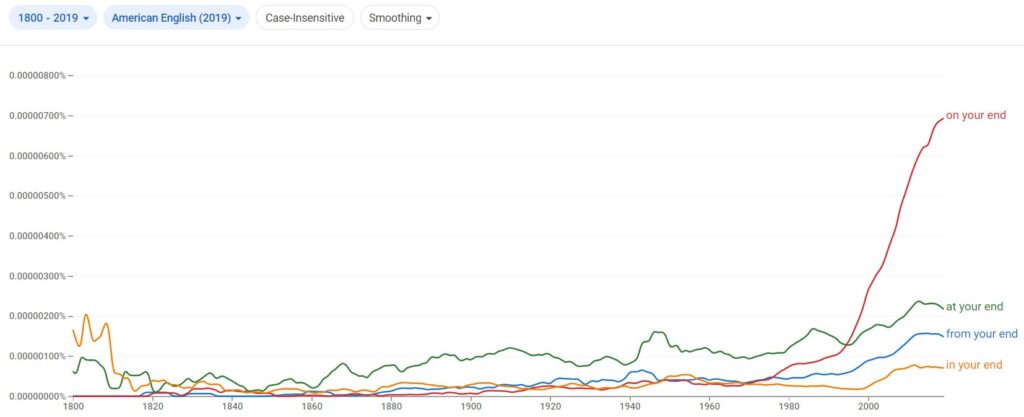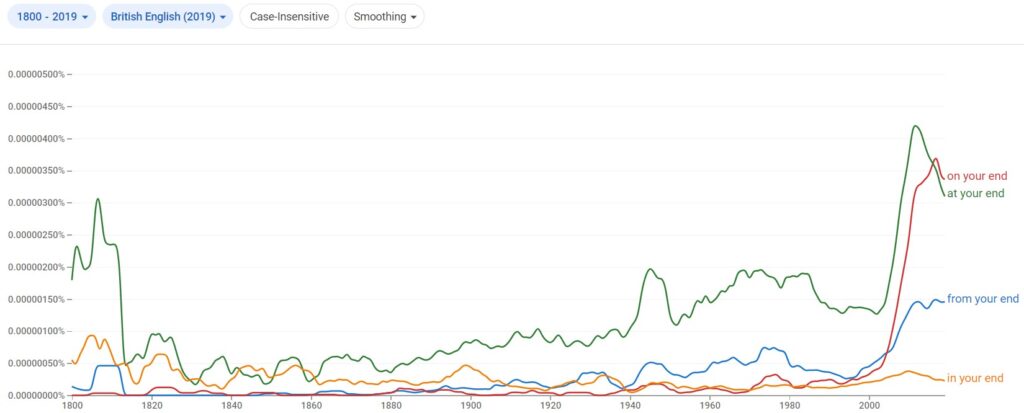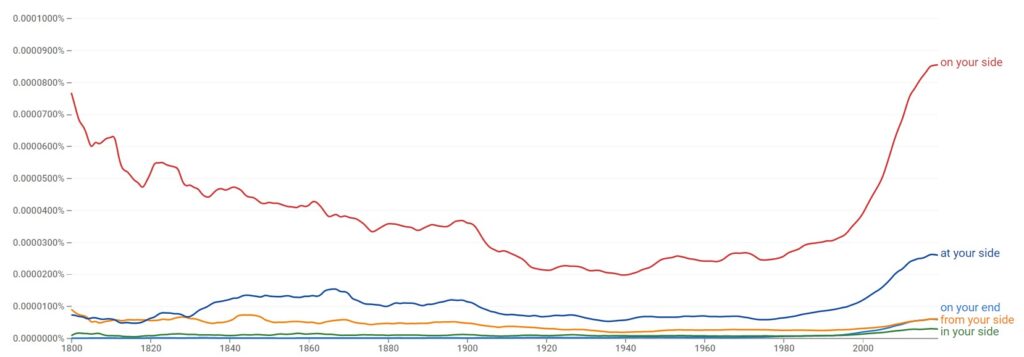Including the preposition “on” before the phrase “your end” is a way of pointing out where somebody is. It’s a common phrase in English, but there are key differences between using it in British and American English. This article will explore the meaning and usage of the phrase.
What Does “On Your End” Mean?
“On your end” means the place where somebody is located. It can refer to a physical location (i.e., “how’s the weather on your end?”), or a place where they’re at mentally (i.e., “how is everything on your end?”). In British English, they use “at your end.”

Both phrases “on your end” and “at your end” are correct. It mostly depends on which language you choose to use. There are also a few other prepositions you might hear, such as:
- On your end
- From your end
- At your end
- In your end
This article will also explore what these prepositions do to change the meaning of the phrase.
Should I Use ON, FROM, AT, Or IN Before “Your End”?
“On your end” is correct in American English, while “at your end” is correct in British English. “From your end” is slightly more specific and is synonymous with “from your perspective.” “In your end” is the least popular and used only when talking about being “inside” something.
We can use this graph to show the key differences between each phrase. “On your end” is a heavy favorite since this graph considers a lot of historical English literature (and American English makes up a large bulk of that).

“At your end” is the second most popular, with “from your end” not too far behind it. This is because British English doesn’t cover as wide of a range as American English, so the data for “at your end” is skewed. Also, even British English users use “on your end” to some extent.
“In your end” is very uncommon. That’s because the situations and contexts where it makes sense simply don’t come up very often. It works similarly to the others, but we have to have very particular circumstances.
Are Different Prepositions Used With “Your End” In American English And British English?
We can take the above graph further and show you the specific changes between the prepositions based on which language is used.
This is the graph for American English. It shows that “on your end” is a clear favorite, and all of the others are very low down on the graph since none of them get used often.

The graph for British English varies completely from the American English one. “At your end” and “on your end” are both equal in popularity, while “from your end” is somewhere in the middle and “in your end” is at the bottom again.

It’s clear from these graphs that American English favors “on your end,” while British English changes between “on” and “at your end.”
With the growing presence of American English in dictionaries and textbooks, it’s no surprise that even British English are adopting the American ways. You’ll notice from the British English graph that “at your end” was the most popular choice until the last two decades, when “on your end” came through on top.
Examples Of How To Use “On Your End” In A Sentence
We can show you some examples of each of the phrases, so you understand how they work. The key ones to look at are “on your end” and “at your end,” and they’re dependent on which language you’re writing with.
“On your end” is American English. We use it to talk about somewhere a person physically or mentally is.
- How is everything doing on your end?
- What’s the weather like on your end?
- Are there any nice stores around on your end?
- There’s plenty of fine stores on my end.
- On your end, I can understand why you’re struggling with the children.
“On your end” refers to a physical or mental place. Incidentally, when we use “your,” it’s typical to phrase the sentence as a question. We can change the pronoun to “my” or “our” when we want to make a statement about it.
Examples Of How To Use “From Your End” In A Sentence
“From your end” is slightly more specific than the other choices. It refers to a perspective of something rather than a physical location.
“From your end” is synonymous with “from your perspective.” It gives us someone’s opinion or idea without worrying about their physical location in the world.
- From your end, I can see why you’d think I don’t like you.
- Is there anything you noticed about them from your end?
- How did they respond to that from your end?
- From my end, it was clear that he wasn’t going to get what he wanted.
- I don’t think they were the happiest people, at least not from our end.
As you can see, we’re talking about a perspective or observation of some kind when using “from your end.”
Examples Of How To Use “At Your End” In A Sentence
“At your end” is identical to “on your end.” However, it’s the British English variation. If you write in American English, you’ll almost never see this one, so you can skip this section if that’s the case.
“At your end” is British English. It refers to the physical or mental location of somebody, just like “on your end” does.
- How are you feeling at your end?
- Is there anything else needed at your end?
- At your end, I can understand why you’d want to move.
- The weather is lovely at my end!
- There isn’t much to do over at our end.
The examples for “at your end” or “at my end” are synonymous with “on your end” and “on my end.” We can use either of the two and be correct in both languages, though most American English speakers will be confused to hear “at your end” rather than “on.”
Examples Of How To Use “In Your End” In A Sentence
“In your end” is the least common choice of the four prepositions. It’s rare that you’ll find a situation that ever works for it, but we still felt it best to cover it with a few helpful examples.
“In your end” means the physical location “inside” of something. It doesn’t refer to a mental issue, only a physical location.
- Is there anything interesting in your end?
- In your end, are there enough house plants?
- I’m in your end this weekend if you fancy catching up.
- I’ll be in your end by Christmas, so keep an eye out!
- He’ll be in my end over the holidays!
As you can see, all of the instances where “in your end” works are also instances where “on” or “at” also work. You’re better off using one of the more popular ones, as most English speakers will understand you better.
On Your End – Synonyms
Let’s go over a few alternatives you might be able to use. If you’re struggling with the usage of the prepositions with “your end,” some of these might be more appropriate for you.
- Where you are
- By you
- Over by you
- Near you
- From your side
- From your point of view
These synonyms are great for both physical and mental things when using “on your end.”
Should I Use “Your End” Or “Your Side”?
It’s not just “end” that we can use when writing with these prepositions. We can also use “your side” with the same starting words and see how they might differ.
According to this graph, “on your side” is the most popular of the four prepositions. “At your side” is another popular choice, though much less common. Also, “on your end” is barely visible on this graph, which shows how rarely we use it compared to “on your side.”

You should use “on your side” when you want to say you’re of the same opinion and supporting someone. You should use “at your side” when you’re physically next to somebody or helping them through something.
“From your side” is less popular and is another way of asking “from your perspective” about opinions.
“In your side” is virtually never used, and most English speakers think it sounds strange, so you should avoid it.
Should I Use “Your End” Or “Your Place”?
“Your place” is another option we can work with.
According to this graph, “in your place” and “at your place” are both the popular choices of the four. Again, “on your end” is barely recognizable on this graph, showing how popular “in” or “at your place” are compared with it.
You should use “in your place” and “at your place” synonymously to mean you’re physically inside someone’s house or that you’d like to meet them there.
“From your place” is only used when somebody is leaving their place to visit another “place” in the world. It could be to meet up with a friend or attend a meeting.
“On your place” is the least popular one here. We rarely use it, so you should avoid doing so. It only works if you’re actually on the roof of somebody’s house (which is very rare).
What Does “Nothing On My End” Mean?
“Nothing on my end” means there is nothing to do on the speaker’s “end.” It means that there’s nothing to report and nothing to say, so the conversation should move on from it.
You may also like: “At My End” vs. “On My Part” – Difference Explained

Martin holds a Master’s degree in Finance and International Business. He has six years of experience in professional communication with clients, executives, and colleagues. Furthermore, he has teaching experience from Aarhus University. Martin has been featured as an expert in communication and teaching on Forbes and Shopify. Read more about Martin here.
